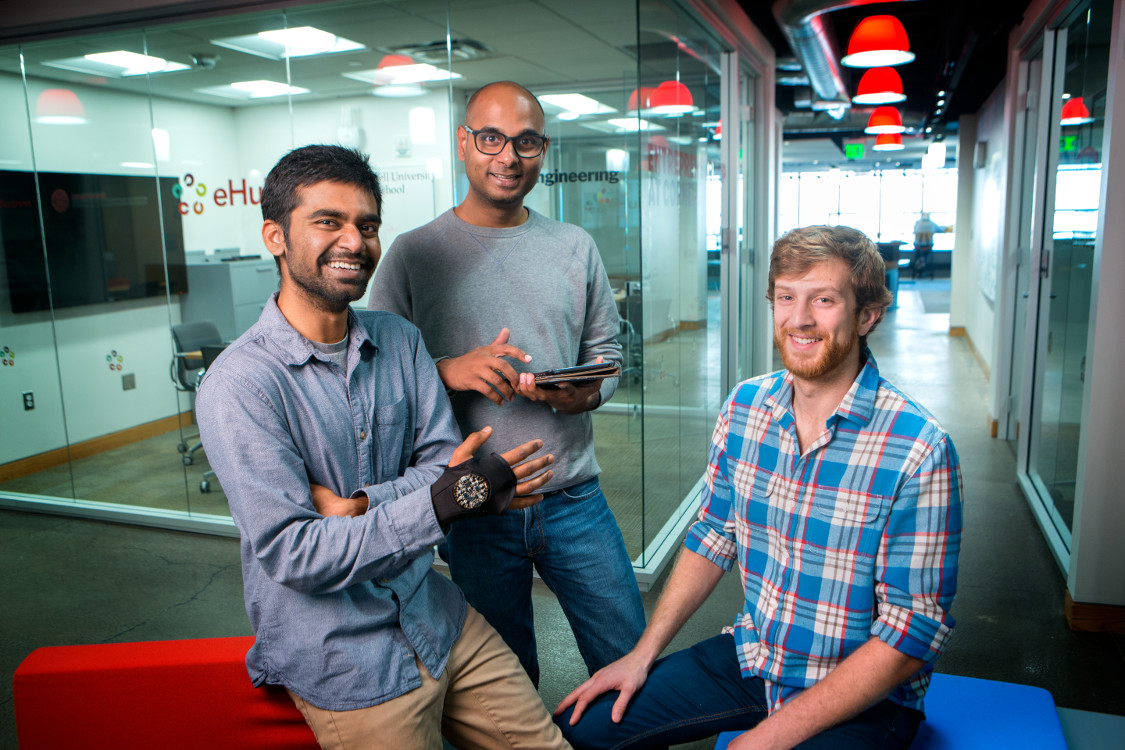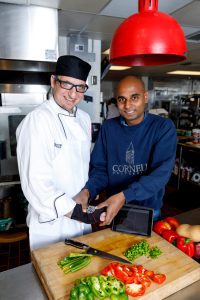
Cornell Startup Orthofit Raises $50k More to Combat Workplace Injuries
Two years ago, three Cornell University students sat in the lab, hunched over their computers, typing their respective doctoral theses and papers. Their muscles began to ache and they started to complain to one another. That commiseration led Jason Guss (PhD ’18, Biomedical Engineering), Apoorva Kiran (PhD ’17, Mechanical Engineering)’s, and Pankaj Singh (PhD ’17 Mechanical Engineering) to create a solution which evolved into their current startup company—Orthofit.
Today, Orthofit is the newest member of Ithaca’s incubator, Rev: Ithaca Startup Works, and is refining the prototype of its signature product—a “smart” glove embedded with sensors to track hand and wrist actions during the workday. The glove will allow organizations to collect data on their employees’ risk of contracting carpel tunnel syndrome and other common, repetitive-use injuries.
As Orthofit has made strides in developing its prototype and business plan, the company has attracted the attention of investors. In January, Orthofit received $50,000 in seed capital from Launch NY, a venture development organization that provides mentoring and financing to high potential startups in Upstate New York.
Orthofit’s progress over the past two years is also a testament to the value of Cornell’s entrepreneurship programs—which Guss called “instrumental” to the firm’s growth—in helping startups with great ideas hone their business models. Initially Orthofit designed a glove that would vibrate when the user’s hand moved into an unsafe position, for example, while working on a computer. After conducting market research during Rev’s Summer Hardware Accelerator program and Cornell’s eLab course, Guss and Kiran shifted their product concept and produced a different type of glove—one that measured movements and acted as a data collection tool.
“We were founded by three PhD students, but we don’t have much business experience in terms of startups,” said Guss. “The staff at Rev has helped mentor us and give us that understanding of what we should be doing on the business side of things—how to look for a value proposition and identify customers. We’re smart, technical people, but that doesn’t automatically translate to success in business, and they’ve really helped with that.”
Orthofit’s glove should have wide utility: the company estimates there are 1 million annual cases of work-related muscoskeletal injuries in the United States, with a staggering associated cost of $54 billion. While Guss said they plan to initially test the prototype with the heavy computer users in the Cornell Library’s Technical Services Department, the firm also has received strong interest from the meat processing industry and is in discussions with a large organization about running a pilot.
“Within a week of reaching out to the industry, we got encouraging feedback and a request for meetings from senior level people in safety departments,” said Guss. “It signaled an urgent need.”

Chef Eric Szymczak wears a prototype of the Orthofit glove while chopping vegetables. The Orthofit is monitored by Apoorva Kiran.
After testing and refining the latest prototype, Orthofit plans to raise additional capital this summer. The funding will be used to further develop predictive analytics and hire additional employees to grow the company’s current staff of six—all Cornell graduates.
“Where we want to go in a few years is collect massive data sets on workers, monitoring the tasks they’re performing and what injuries are resulting,” said Guss. “From there, we can develop analytics that can tell, if you’re doing it this way, based on our data set, you’ll be at risk of this type of injury however many years down the line. There are a lot of different ways to find value in these data sets.”
In the meantime, Guss says that the company plans to take advantage of its newly acquired member status at Rev, where they plan to make use of the prototyping lab and network with other local entrepreneurs.
“It’ll be great to be around the mentors and people there [at Rev], and meet them every week or month, instead of just once in a while. I’m excited to meet the other companies and be more a part of the entrepreneurship ecosystem here in Ithaca. That excites you to get up in the morning every day and get to work.”
As the company’s first prototype gets set for testing, Guss said he remains enthusiastic about the support he’s received from the Cornell community.
“Our technology is ours in terms of the intellectual property, since we’ve worked in our own home lab space,” he said. “But in terms of every other possible university resource, we’ve taken advantage of it. From eLab to eHub to mentors and advisors and the people and connections—all of that’s been key in a very tangible way. They’re really pushing entrepreneurship, too, which has given us a lot of exposure. Plus, you can get a lot done without costs being too high. Even though it’s a small town, as a major university, Cornell has a ton of knowledge and smart people right here.”
.
